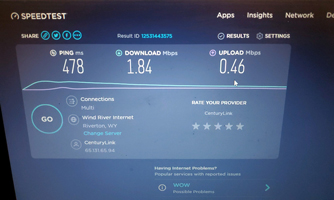I recently had the opportunity of an extended stay in a small town in Wyoming. To be honest, all towns in Wyoming are small but this was small even for Wyoming. As there isn’t much to do in a small Wyoming town in the middle of a winter without snow, I was hoping to take advantage of a lot of focused internet time. I rented a small house with WiFi from a cable internet connection. It was just me and my computer, so a standard cable connection should have been all I needed to get any work done.
I was woefully incorrect. My internet usage consisted of emails, telecom research and website maintenance and updates with internet radio stations streaming in the background. At night, I was testing out various streaming services. The internet during the day was ok but once I started the movies, the screen would lock up waiting for more of the video to download. I didn’t have an ethernet cable to see if it was just a bad WiFi router. I did clear my web cache frequently but that didn’t have any impact. I decided to run a speed test just to see what was going on. Given my movie watching experience, I wasn’t surprised by the results….

A Cable internet download speed of less than 2Mbps!!! I have always had a big city cable internet experience that was more than capable for my needs so dealing with a cable connection that is not fast enough was an eye opener. These results put a fine point on how important having adequate bandwidth that matches your usage, plus a little headroom. It got me to researching suggested bandwidth speeds compared to usage.
I came across a website from the FCC that does a really good job of explaining what bandwidth speeds are needed to support internet usage patterns. According to their calculations, one user browsing, sending/receiving email or checking in on Social Media needs at least a 1 Mbps internet connection. Remember, this is just for one user. A typical work from home office set up requires 5 -25 Mbps. The same for students doing their schooling from home. Then there is the bandwidth needed for Gaming and Streaming services.
So, what can you do to get the best internet service for your particular situation? Your first effort should be to call your service provider to see if they can tweak your existing service to get some more speed. This can be done remotely and while you are on the line. How much additional bandwidth you can get will be nominal at best though. They can also check your modem and router (if you are renting from them) to make sure they are both working correctly or are due for an upgrade. Another option is to ask if there are any other higher bandwidth options availabe.to your location.
If none of these can get you to adequate bandwidth, it’s time to look for other providers that service your location. A cable connection used to be the best way to get on the internet and do everything that you could think to do. The downside of cable is that its capacity is shared by the entire neighborhood. As more and more devices are using more and more of the available bandwidth, users experience less and less of its advertised capability, everyone slows down, especially the unlucky users that are furthest away from its initiation point. At some point, the bandwidth you need can’t be provided by your current connection and you’ll have to look into upgrade options either from your current provider or a competitor.
Teledata Select offers a whole range of services that will help you meet your business goals. Starting with a complimentary review of your current telecommunication bills to identify errors and find opportunities for savings, better service and more functionality. We also offer project management for new service implementation and infrastructure installs, including fiber and low voltage cabling. Call us at 404-257-1502 to discuss your current Telecom Service Solution and what you would like to get out of it. Or send us a note via This Link to start a no obligation discussion of your specific business technology needs.
 Don Miller is a PMP certified Project Manager splits his time between Atlanta and Seattle. He has come to Teledata Select via Seattle, New York and Washington DC. His experience running small to multi-million dollar projects in the Banking, Software, Telecommunications and Insurance Industries across the US has given him a wide range of business.
Don Miller is a PMP certified Project Manager splits his time between Atlanta and Seattle. He has come to Teledata Select via Seattle, New York and Washington DC. His experience running small to multi-million dollar projects in the Banking, Software, Telecommunications and Insurance Industries across the US has given him a wide range of business.




0 Comments